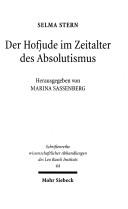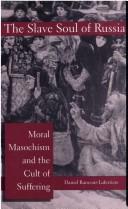| Listing 1 - 10 of 92 | << page >> |
Sort by
|
Periodical
Abstract | Keywords | Export | Availability | Bookmark
 Loading...
Loading...Choose an application
- Reference Manager
- EndNote
- RefWorks (Direct export to RefWorks)
Book
ISBN: 9041405127 Year: 2001 Publisher: Amsterdam : Ambo | Anthos,
Abstract | Keywords | Export | Availability | Bookmark
 Loading...
Loading...Choose an application
- Reference Manager
- EndNote
- RefWorks (Direct export to RefWorks)
traan --- Oogheelkunde --- Endocrinologie --- Ophtalmologie --- History of civilization --- Psychologie --- Geschiedenis --- Histoire

ISBN: 316147662X 3161635965 9783161635960 Year: 1970 Publisher: [s.l.] : Mohr Siebeck GmbH & Co. KG,
Abstract | Keywords | Export | Availability | Bookmark
 Loading...
Loading...Choose an application
- Reference Manager
- EndNote
- RefWorks (Direct export to RefWorks)
Auf sie stützte fast jeder europäische Fürst im 17. und 18. Jahrhundert seine Macht: jüdische Finanziers und Logistiker, politische Berater und Diplomaten, sogenannte "Hofjuden". Das jüdische Hoffaktorentum wurde zur Institution im Dreieck von Politik, Wirtschafts- und Kulturgeschichte. Klangvolle Namen sind mit ihm verbunden. Joseph Süß Oppenheimer, genannt "Jud Süß", wurde zum Inbegriff des deutschen Hofjuden und beschäftigt Historiker, Theatermacher und Komponisten bis in die Gegenwart. Wie real aber ist das Bild, das die deutsche Gesellschaft von ihm und anderen Hoffaktoren entwickelte, nicht zuletzt unter dem Einfluß der antisemitischen Propaganda der Nationalsozialisten? Wie einflußreich waren die Hofjuden wirklich? Die deutsch-jüdische Historikerin Selma Stern (1890-1981) ging diesen Fragen nach, untersuchte Mythos und Wirklichkeit. Begonnen im Deutschland der zwanziger Jahre, erschien ihre Untersuchung erst 1950 im amerikanischen Exil unter dem Titel The Court Jew. Erstmals lag damit ein interdisziplinäres Standardwerk vor. Selma Stern beschreibt darin den Aufstieg und Niedergang von Hoffaktorendynastien wie Behrens, Ephraim, Gumperts, Itzig, Kann oder Wertheimer. Sie arbeitet die wechselseitige Abhängigkeit zwischen Herrschern und Hofjuden heraus und richtet zugleich den Blick auf wirtschaftliche, politische, soziale, kulturelle und historische Zusammenhänge und Entwicklungen im absolutistischen Europa. Mehr als 50 Jahre nach seinem Erscheinen liegt der Band nun als deutsche Erstveröffentlichung vor.
Jewish religion --- History of civilization --- anno 1600-1699 --- Religion --- History / World --- Religion / Christianity / History
Periodical
ISSN: 25872451 13057766 Year: 2000 Publisher: Edirne, Türkiye : T.C. Trakya Üniversitesi Sosyal Bilimler Enstitüsü
Abstract | Keywords | Export | Availability | Bookmark
 Loading...
Loading...Choose an application
- Reference Manager
- EndNote
- RefWorks (Direct export to RefWorks)
Social sciences --- Social sciences. --- Behavioral sciences --- Human sciences --- Sciences, Social --- Social science --- Social studies --- Civilization --- History of civilization
Book
ISBN: 9789004342569 9789004375871 9004342567 9004375872 Year: 2018 Publisher: Leiden; Boston Brill
Abstract | Keywords | Export | Availability | Bookmark
 Loading...
Loading...Choose an application
- Reference Manager
- EndNote
- RefWorks (Direct export to RefWorks)
Domestic Devotions in Early Modern Italy illuminates the vibrancy of spiritual beliefs and practices which profoundly shaped family life in this era. Scholarship on Catholicism has tended to focus on institutions, but the home was the site of religious instruction and reading, prayer and meditation, communal worship, multi-sensory devotions, contemplation of religious images and the performance of rituals, as well as extraordinary events such as miracles. Drawing on a wide range of sources, this volume affirms the central place of the household to spiritual life and reveals the myriad ways in which devotion met domestic needs. The seventeen essays encompass religious history, the histories of art and architecture, material culture, musicology, literary history, and social and cultural history. Contributors are Erminia Ardissino, Michele Bacci, Michael J. Brody, Giorgio Caravale, Maya Corry, Remi Chiu, Sabrina Corbellini, Stefano Dall'Aglio, Marco Faini, Iain Fenlon, Irene Galandra Cooper, Jane Garnett, Joanna Kostylo, Alessia Meneghin, Margaret A. Morse, Elisa Novi Chavarria, Gervase Rosser, Zuzanna Sarnecka, Katherine Tycz, and Valeria Viola.
Iconography --- History of civilization --- anno 1500-1599 --- Italy --- Families --- Religious life --- History --- Catholic Church --- History. --- religious life --- history --- Catholic church
Multi
ISBN: 9789004342569 9789004375871 9004342567 9004375872 Year: 2018 Publisher: Leiden; Boston Brill
Abstract | Keywords | Export | Availability | Bookmark
 Loading...
Loading...Choose an application
- Reference Manager
- EndNote
- RefWorks (Direct export to RefWorks)
Domestic Devotions in Early Modern Italy illuminates the vibrancy of spiritual beliefs and practices which profoundly shaped family life in this era. Scholarship on Catholicism has tended to focus on institutions, but the home was the site of religious instruction and reading, prayer and meditation, communal worship, multi-sensory devotions, contemplation of religious images and the performance of rituals, as well as extraordinary events such as miracles. Drawing on a wide range of sources, this volume affirms the central place of the household to spiritual life and reveals the myriad ways in which devotion met domestic needs. The seventeen essays encompass religious history, the histories of art and architecture, material culture, musicology, literary history, and social and cultural history. Contributors are Erminia Ardissino, Michele Bacci, Michael J. Brody, Giorgio Caravale, Maya Corry, Remi Chiu, Sabrina Corbellini, Stefano Dall'Aglio, Marco Faini, Iain Fenlon, Irene Galandra Cooper, Jane Garnett, Joanna Kostylo, Alessia Meneghin, Margaret A. Morse, Elisa Novi Chavarria, Gervase Rosser, Zuzanna Sarnecka, Katherine Tycz, and Valeria Viola.
Iconography --- History of civilization --- anno 1500-1599 --- Italy --- Families --- Religious life --- History --- Catholic Church --- History. --- religious life --- history --- Catholic church
Book
ISBN: 0801414644 1501723197 9781501723193 9780801414640 1501723200 1501728091 Year: 1982 Publisher: London
Abstract | Keywords | Export | Availability | Bookmark
 Loading...
Loading...Choose an application
- Reference Manager
- EndNote
- RefWorks (Direct export to RefWorks)
Timothy J. Reiss perceives a new mode of discourse emerging in early seventeenth-century Europe; he believes that this form of thought, still our own, may itself soon be giving way. In The Discourse of Modernism, Reiss sets up a theoretical model to describe the process by which one dominant class of discourse is replaced by another. He seeks to demonstrate that each new mode does not constitute a radical break from the past but in fact develops directly from its predecessor.
Comparative literature --- Theory of knowledge --- Philosophy of science --- History of civilization --- Thematology --- anno 1600-1699 --- Epistemics --- Knowledge, Theory of --- Epistemology --- Philosophy --- Psychology --- General semantics --- Knowledge, Theory of. --- Epistemics.
Book
ISBN: 2130365922 9782130365921 Year: 1980 Volume: 1872 Publisher: Paris: PUF,
Abstract | Keywords | Export | Availability | Bookmark
 Loading...
Loading...Choose an application
- Reference Manager
- EndNote
- RefWorks (Direct export to RefWorks)
I. Ruptures et continuités historiques - II. Les grandes aventures médiévales - III. Le choc du monde moderne - IV. De l'idée d' Europe à la réalité européenne - V. L'Europe foyer du libéralisme - Conclusion - Bibliographie sommaire
History of civilization --- Europe --- Civilization --- Civilisation --- 930.85 --- Civilisation Beschaving --- Société Maatschappij --- Politique Politiek --- Europe Europa --- Histoire Geschiedenis --- Désherbage --- Deselectie --- Civilization. --- Europe - Civilization
Periodical
ISSN: 21467099 26022745
Abstract | Keywords | Export | Availability | Bookmark
 Loading...
Loading...Choose an application
- Reference Manager
- EndNote
- RefWorks (Direct export to RefWorks)
Humanities --- Social sciences --- Humanities. --- Social sciences. --- social science --- Behavioral sciences --- Human sciences --- Sciences, Social --- Social science --- Social studies --- Civilization --- Learning and scholarship --- Classical education --- History of civilization

ISBN: 0814774822 081477458X 0814769403 0585368287 9780814769409 Year: 1995 Publisher: New York, NY : New York University Press,
Abstract | Keywords | Export | Availability | Bookmark
 Loading...
Loading...Choose an application
- Reference Manager
- EndNote
- RefWorks (Direct export to RefWorks)
Why, asks Daniel Rancour-Laferriere in this controversial book, has Russia been a country of suffering? Russian history, religion, folklore, and literature are rife with suffering. The plight of Anna Karenina, the submissiveness of serfs in the 16th and 17th centuries, ancient religious tracts emphasizing humility as the mother of virtues, the trauma of the Bolshevik revolution, the current economic upheavals wracking the country-- these are only a few of the symptoms of what The Slave Soul of Russia identifies as a veritable cult of suffering that has been centuries in the making. Bringing to light dozens of examples of self-defeating activities and behaviors that have become an integral component of the Russian psyche, Rancour-Laferriere convincingly illustrates how masochism has become a fact of everyday life in Russia. Until now, much attention has been paid to the psychology of Russia's leaders and their impact on the country's condition. Here, for the first time, is a compelling portrait of the Russian people's psychology.
National characteristics, Russian. --- Masochism --- Self-destructive behavior --- Russia (Federation) --- Civilization. --- Psychic masochism --- Russian national characteristics --- Self-destructiveness --- Paraphilias --- Personality disorders --- Sadomasochism --- Suffering --- Psychology, Pathological --- History of civilization --- Russia
| Listing 1 - 10 of 92 | << page >> |
Sort by
|

 Search
Search Feedback
Feedback About UniCat
About UniCat  Help
Help News
News